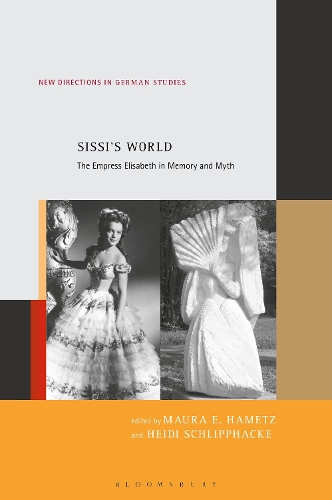
Sissis World: The Empress Elisabeth in Memory and Myth
(Hardback)
Publishing Details
Sissis World: The Empress Elisabeth in Memory and Myth
By (Author) Dr. Maura E. Hametz
Edited by Heidi Schlipphacke
Bloomsbury Publishing PLC
Bloomsbury Academic USA
12th July 2018
United States
Classifications
Tertiary Education
Non Fiction
European history
943.6044092
Physical Properties
Hardback
408
Width 140mm, Height 216mm
621g
Description
Sissis World offers a transdisciplinary approach to the study of the Habsburg Empress Elisabeth of Austria. It investigates the myths, legends, and representations across literature, art, film, and other media of one of the most popular, revered, and misunderstood female figures in European cultural history. Sissis World explores the cultural foundations for the endurance of the Sissi legends and the continuing fascination with the beautiful empress: a Bavarian duchess born in 1837, the longest-serving Austrian empress, and the queen of Hungary who died in 1898 at the hands of a crazed anarchist. Despite the continuing fascination with the beloved Sissi," the Habsburg empress, her impact, and legacy have received scant attention from scholars. This collection will go beyond the popular biographical accounts, recountings of her mythic beauty, and scattered studies of her well-known eccentricities to offer transdisciplinary cultural perspectives across art, film, fashion, history, literature, and media.
Reviews
Given the general lack of academic research on the Sissi phenomenon, this volume fills a scholarly void, going beyond the often hagiographical historical accounts and appropriation of her image to interrogate what has been going on beneath such surface manifestations The editors have judiciously selected trans-disciplinary approaches that go beyond the marketing of an image to excavate how and why [Sissis] memory and attendant mythology retain their hold on people the world over This volume stands out for the quality and consistency of its individual chapters and contains a comprehensive bibliographical apparatus that will be useful to scholars, students, and interested readers alike. The editors are clearly well read in theory and cultural history, bringing nuanced perspectives to the wide range of essays collected here. Handsomely presented with no lacunae, it is part of the exciting series New Directions in German Studies from Bloomsbury and is a valuable addition to Austrian studies, broadly defined. * German Quarterly *
Excellent and engagingIt is a collection best read, in my opinion, from cover to cover, for this is the only way to fully appreciate how well its chapters cohere around its fragmented and protean subject. * Journal of Austrian Studies *
Many anthologies suffer from unevenness in the quality of the contributions, but not this one each of the individual chapters is compelling and largely unique, with only minor overlap across several contributions. The editors are to be congratulated on compiling such a readable, accessible volume that considers this fascinating topic so thoroughly. * Feminist German Studies *
From Trieste to Beijing, these riveting essays analyze the highly situational character of our obsessions with the restless Empress. From her renowned hair and waist to the rigid control she exercised over her public image, these essays show how Elisabeths imagined personality has served us as a screen for a surprising range of fantasies, from 1950s femininity to the contemporary queer and subversive. * Pieter M. Judson, Chair, Department of History and Civilization, European University Institute, Italy *
Empress Elisabeth of Austria embodied the contradictions of monarchical rule in life and death. Revered yet deeply unhappy; a figure of national imagination yet profoundly rootless; bathed in splendor yet bodily starved. Despite or perhaps because of that incongruity, she remains a projection screen of imperial longing, reminding us of inextricable links between history, memory, and nostalgia in the realm of the former Habsburg Monarchy. Sissis World grapples in novel ways with the complex tensions reflected in the figure of Empress Elisabeth. * Matti Bunzl, Director, Museen der Stadt Wien, Austria *
This remarkable collection of essays on the memory and myth of the Austrian Empress Elisabeth, known as Sissi, is a long-awaited compendium of research and contextualization that ranges far beyond the popular hagiography to offer wholly fresh analysis of the subject as a complex woman, enlightened royal, and uniquely enduring and influential cultural icon. Editors Maura Hametz and Heidi Schlipphacke have drawn together international scholars, transdisciplinary aspects, and diverse critical approaches for a superbly executed expansion of literature on Elisabeth as she was in her world and as she continues to find resonance in ours. Sissis World is essential reading that will inspire serious investigation on the subject for some time to come. * Robert Dassanowsky, President Emeritus of the Austrian Studies Association and Professor of German and Visual and Performing Arts, University of Colorado, Colorado Springs, USA *
Its perceptive analyses, global reach, and interdisciplinary scope make Sissis World an impressive accomplishment. [] [T]he volume offers much fascinating material, and I highly recommend it to anyone interested in Austrian culture and gender studies. -- Elisabeth Krimmer, University of California, Davis, USA * Goethe Yearbook *
Author Bio
Maura E. Hametz is Professor of History at Old Dominion University in Norfolk, Virginia, USA. Her research explores the history of Trieste and the northeastern Adriatic regions since the late 19th century with emphasis on the intersections of politics, culture, economy, law, religion, gender, and ethnicity and nationalism. Her major works include In the Name of Italy (2012) and Making Trieste Italian, 1918-1954 (2005), and she co-edited Jewish Intellectual Women in Central Europe, 1860-2000 (2012). Heidi Schlipphacke is Associate Professor of Germanic Studies at the University of Illinois at Chicago, USA. Her research focuses on the German Enlightenment and its critique, kinship and family structures, post-war German and Austrian literature and film, and queer and gender studies. She is the author of Nostalgia After Nazism: History, Home and Affect in German and Austrian Literature and Film (2010).
